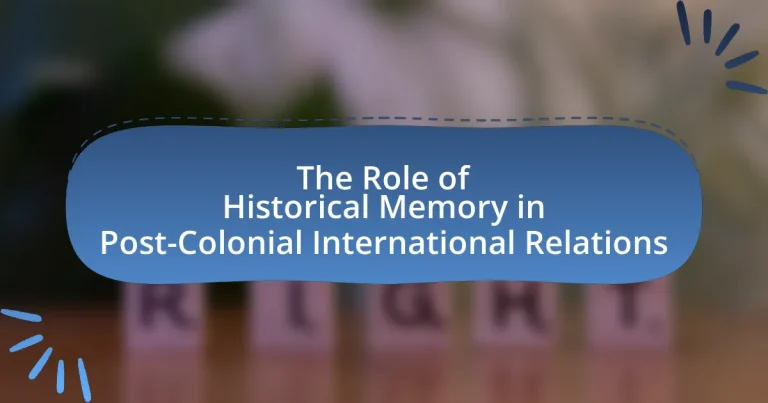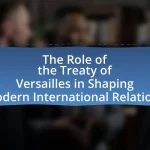The article examines the critical role of historical memory in shaping post-colonial international relations, emphasizing how collective narratives of colonial experiences influence national identities and diplomatic interactions. It discusses the impact of historical grievances on trust and alliances among post-colonial states, highlighting examples from countries like India, South Africa, and various African nations. Key elements such as collective identity, narratives of victimhood, and the legacy of colonialism are explored, along with strategies for addressing historical grievances in diplomacy. The article also addresses regional variations in historical memory and their implications for contemporary foreign policy, illustrating how nations can navigate these complexities to foster better international relations.
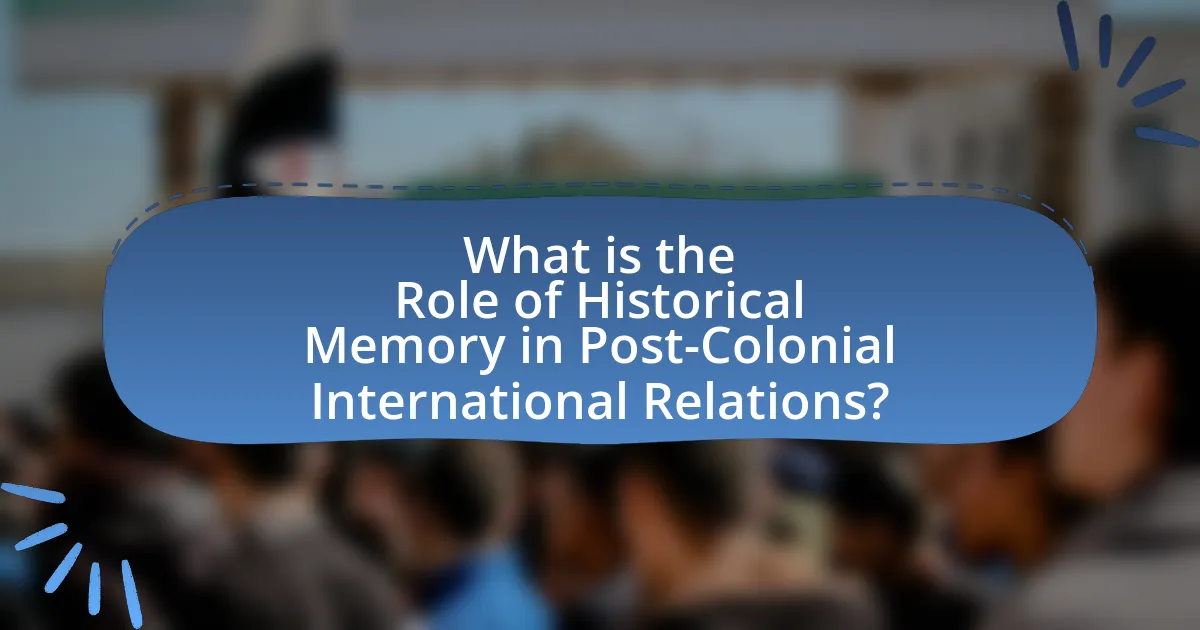
What is the Role of Historical Memory in Post-Colonial International Relations?
Historical memory plays a crucial role in post-colonial international relations by shaping national identities and influencing diplomatic interactions. This memory often reflects the historical injustices and traumas experienced during colonial rule, which can lead to a collective consciousness that affects how former colonies engage with former colonizers. For instance, countries like India and South Africa have utilized their historical narratives to assert their sovereignty and challenge neocolonial practices, thereby impacting their foreign policies and alliances. The acknowledgment of past grievances can foster solidarity among post-colonial states, as seen in the Non-Aligned Movement, where shared histories of colonialism unite nations in their quest for equitable global governance.
How does historical memory shape the identities of post-colonial states?
Historical memory significantly shapes the identities of post-colonial states by influencing their collective narratives and national consciousness. This influence manifests through the remembrance of colonial experiences, resistance movements, and the struggle for independence, which collectively inform the values, symbols, and political ideologies of these nations. For instance, countries like India and Algeria have constructed their national identities around the memory of colonial oppression and the fight for liberation, which are integral to their contemporary political discourse and cultural expressions. This historical context fosters a sense of unity and purpose among citizens, as seen in the emphasis on anti-colonial sentiments in national education systems and public commemorations. Thus, historical memory acts as a foundational element in the ongoing development of post-colonial identities, shaping how these states engage with their past and envision their future on the global stage.
What are the key elements of historical memory in these contexts?
The key elements of historical memory in post-colonial international relations include collective identity, narratives of victimhood, and the legacy of colonialism. Collective identity shapes how nations perceive themselves and their place in the world, often influenced by shared historical experiences. Narratives of victimhood highlight the injustices faced during colonial rule, fostering solidarity among formerly colonized nations. The legacy of colonialism manifests in ongoing socio-economic disparities and political tensions, which continue to affect diplomatic relations. These elements are crucial for understanding how historical grievances influence contemporary interactions between post-colonial states.
How do narratives of colonialism influence national identity?
Narratives of colonialism significantly shape national identity by framing collective memory and cultural understanding. These narratives often highlight themes of resistance, resilience, and the struggle for independence, which become integral to a nation’s self-conception. For instance, in countries like India, the narrative of British colonial rule and the subsequent fight for independence fosters a sense of unity and pride among citizens, influencing their national identity. Historical events, such as the Indian Rebellion of 1857, are commemorated and serve as symbols of national identity, reinforcing a collective memory that emphasizes sovereignty and cultural heritage. Thus, the way colonial histories are interpreted and taught directly impacts how nations perceive themselves and their place in the world.
Why is historical memory significant in diplomatic relations?
Historical memory is significant in diplomatic relations because it shapes national identities and influences perceptions between countries. This collective memory can lead to either reconciliation or conflict, as seen in post-colonial contexts where historical grievances often affect current diplomatic interactions. For instance, the legacy of colonialism continues to impact relations between former colonial powers and their colonies, as evidenced by ongoing debates over reparations and acknowledgment of historical injustices. Such memories can either foster mutual understanding and cooperation or exacerbate tensions, highlighting the importance of addressing historical narratives in diplomatic discourse.
How does historical memory affect trust between post-colonial nations?
Historical memory significantly affects trust between post-colonial nations by shaping perceptions of past injustices and grievances. This collective memory influences how nations view each other, often leading to mistrust if historical conflicts or colonial exploitation are not acknowledged or reconciled. For instance, the legacy of British colonialism in India continues to impact Indo-British relations, where historical narratives of oppression and resistance shape contemporary diplomatic interactions. Additionally, the Rwandan Genocide’s memory affects relations between Rwanda and its neighbors, as historical grievances can fuel ongoing tensions. Thus, the way nations remember and interpret their shared histories plays a crucial role in building or undermining trust in post-colonial contexts.
What role does historical memory play in conflict resolution?
Historical memory plays a crucial role in conflict resolution by shaping collective identities and influencing perceptions of justice and legitimacy. It affects how groups remember past grievances and atrocities, which can either exacerbate tensions or facilitate reconciliation. For instance, in post-apartheid South Africa, the Truth and Reconciliation Commission utilized historical memory to address past injustices, promoting healing and fostering dialogue between conflicting parties. This approach demonstrates that acknowledging historical narratives can help build trust and understanding, essential components for resolving conflicts.
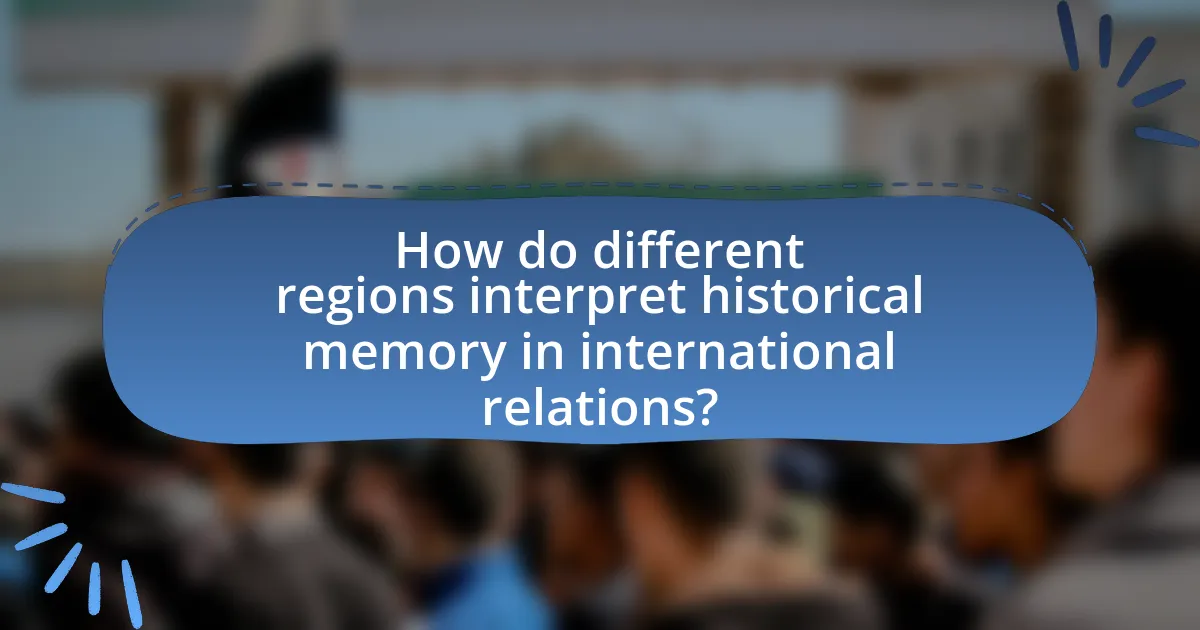
How do different regions interpret historical memory in international relations?
Different regions interpret historical memory in international relations through the lens of their unique historical experiences and cultural narratives. For instance, in Europe, countries often reflect on World War II and the Holocaust, shaping their collective memory towards themes of reconciliation and human rights, which influences their diplomatic relations and policies. In contrast, African nations may emphasize colonial histories and struggles for independence, leading to a focus on sovereignty and reparations in their international engagements. This divergence is evident in how post-colonial states advocate for a re-examination of historical injustices in global forums, such as the United Nations, where they seek acknowledgment and redress for past wrongs. The interpretation of historical memory thus serves as a critical framework that informs regional identities and geopolitical strategies, impacting alliances and conflicts on the international stage.
What are the regional variations in historical memory among post-colonial states?
Regional variations in historical memory among post-colonial states are influenced by factors such as colonial experiences, national narratives, and socio-political contexts. For instance, in Africa, countries like Kenya emphasize the Mau Mau Uprising against British colonial rule, shaping a collective memory that fosters national identity and resistance narratives. In contrast, India’s historical memory focuses on the non-violent struggle for independence led by figures like Mahatma Gandhi, which promotes a narrative of unity and peaceful resistance.
In Southeast Asia, nations like Vietnam commemorate the struggle against French colonialism and American intervention, which informs their national identity and foreign policy. Meanwhile, in the Caribbean, countries such as Jamaica reflect on the legacy of slavery and colonial exploitation, leading to a historical memory that emphasizes cultural resilience and identity formation. These variations illustrate how different colonial legacies and historical interpretations shape the political and social landscapes of post-colonial states, influencing their international relations and domestic policies.
How do African nations perceive their colonial past in international contexts?
African nations generally perceive their colonial past as a significant factor influencing their identity and international relations. This perception is rooted in the historical injustices and exploitation experienced during colonial rule, which continue to affect socio-economic and political dynamics today. For instance, many African countries advocate for reparations and acknowledgment of colonial atrocities in international forums, reflecting a desire for justice and recognition. Additionally, the legacy of colonialism shapes diplomatic strategies, as nations often seek to assert their sovereignty and promote pan-African solidarity against perceived neo-colonial influences. This perspective is supported by various studies, including the African Union’s Agenda 2063, which emphasizes the importance of historical memory in fostering unity and development across the continent.
What unique perspectives do Asian post-colonial states hold regarding historical memory?
Asian post-colonial states hold unique perspectives on historical memory that emphasize the complexities of colonial legacies and the importance of reclaiming narratives. These states often view historical memory as a tool for national identity formation, allowing them to challenge dominant Western narratives and assert their own experiences of colonization and resistance. For instance, countries like India and Vietnam utilize historical memory to foster a sense of unity and resilience among their populations, highlighting events such as the Indian independence movement and the Vietnam War as pivotal moments of self-determination. This perspective is supported by the fact that historical memory in these contexts is not merely about remembering the past but actively shaping contemporary political discourse and international relations, as seen in the way these nations engage with former colonial powers and advocate for reparative justice.
How does historical memory influence contemporary foreign policy?
Historical memory significantly influences contemporary foreign policy by shaping national identities and perceptions of past injustices. For instance, countries with a history of colonialism often prioritize reparative measures and diplomatic relations that acknowledge historical grievances, as seen in the policies of nations like South Africa, which emphasizes reconciliation and acknowledgment of apartheid’s legacy in its foreign relations. This influence is evident in how nations engage with former colonial powers, often demanding accountability and reparations, which reflects a collective memory that informs current diplomatic strategies. Additionally, historical memory can lead to alliances based on shared past experiences, as seen in the relationships among post-colonial states that seek to counterbalance the influence of former colonial powers.
What examples illustrate the impact of historical memory on foreign policy decisions?
Historical memory significantly influences foreign policy decisions, as seen in the cases of Germany’s approach to its World War II legacy and Japan’s post-war relations with its neighbors. Germany’s commitment to reconciliation and reparations with countries affected by the Holocaust and Nazi occupation reflects a conscious effort to address historical grievances, shaping its diplomatic relations and fostering a reputation as a responsible global actor. Similarly, Japan’s reluctance to fully acknowledge its wartime actions, such as the Nanjing Massacre, has strained relations with China and South Korea, illustrating how historical memory can hinder diplomatic progress and affect regional stability. These examples demonstrate that the collective memory of past events can directly impact contemporary foreign policy strategies and international relations.
How do historical grievances shape alliances and partnerships?
Historical grievances significantly shape alliances and partnerships by influencing nations’ perceptions and interactions based on past injustices. For instance, countries that have experienced colonial oppression often form alliances to counterbalance the influence of former colonial powers, as seen in the Non-Aligned Movement during the Cold War, where nations sought solidarity against imperialism. Additionally, historical grievances can lead to the establishment of partnerships based on shared experiences of victimization, such as the collaboration between African nations in response to the legacy of colonialism and apartheid. These alliances are often reinforced by collective memory, which fosters a sense of unity and purpose among nations with similar historical narratives, ultimately guiding their diplomatic strategies and international relations.
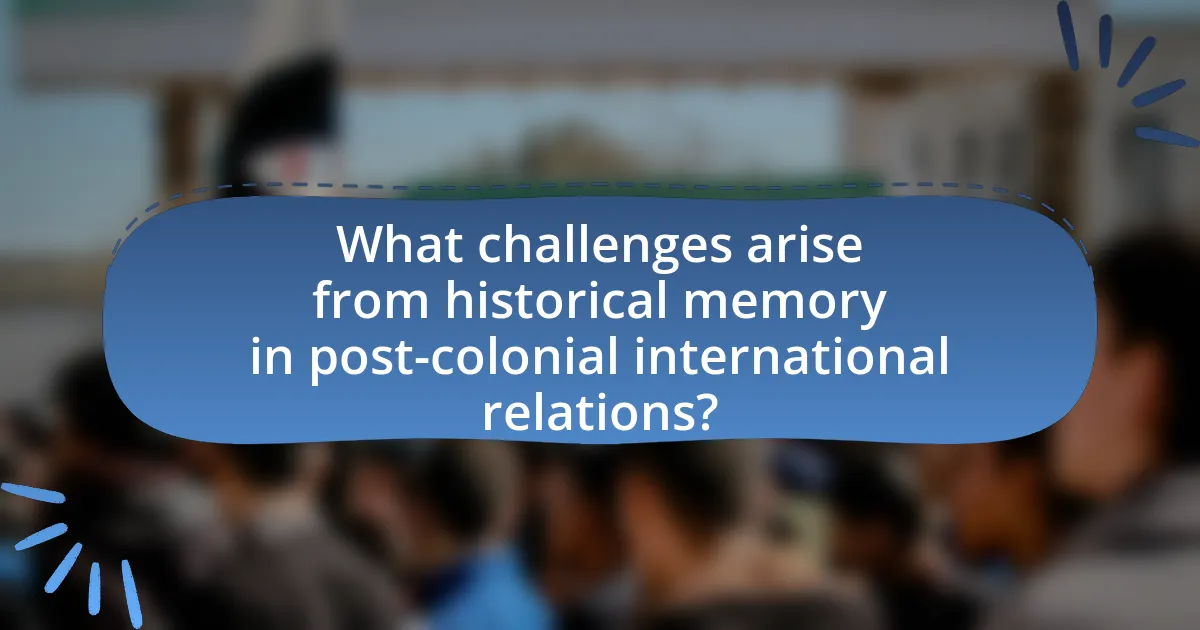
What challenges arise from historical memory in post-colonial international relations?
Historical memory in post-colonial international relations presents challenges such as the perpetuation of grievances, identity conflicts, and the difficulty in achieving reconciliation. These challenges arise because historical narratives often shape national identities and influence diplomatic relations. For instance, countries with colonial histories may harbor resentment towards former colonizers, complicating negotiations and cooperation. Additionally, differing interpretations of historical events can lead to tensions between nations, as seen in disputes over territorial claims or reparations. The legacy of colonialism can also hinder the establishment of trust, making it difficult for post-colonial states to engage in constructive dialogue.
What are the potential pitfalls of historical memory in diplomatic engagements?
The potential pitfalls of historical memory in diplomatic engagements include the risk of misinterpretation, selective remembrance, and the perpetuation of grievances. Misinterpretation occurs when historical events are viewed through biased lenses, leading to misunderstandings between nations. Selective remembrance can result in one party emphasizing certain historical narratives while ignoring others, which can skew perceptions and hinder constructive dialogue. Additionally, the perpetuation of grievances rooted in historical injustices can create a cycle of resentment, making it difficult to achieve reconciliation and cooperation. For instance, the legacy of colonialism often influences contemporary diplomatic relations, as nations grapple with the historical injustices that shape their identities and interactions.
How can historical memory lead to misunderstandings between nations?
Historical memory can lead to misunderstandings between nations by shaping national identities and influencing perceptions of past events. For instance, differing interpretations of colonial histories can create conflicting narratives, where one nation views its actions as liberation while another sees them as oppression. This divergence can result in diplomatic tensions, as seen in the historical grievances between countries like France and Algeria, where France’s colonial past is viewed through a lens of pride by some and trauma by others. Such contrasting historical memories can hinder reconciliation efforts and fuel ongoing disputes, demonstrating how the legacy of the past continues to impact present-day international relations.
What role does historical memory play in perpetuating stereotypes?
Historical memory plays a crucial role in perpetuating stereotypes by shaping collective identities and influencing perceptions of different groups. This occurs as societies recall and interpret past events, often emphasizing narratives that reinforce existing biases. For instance, colonial histories frequently depict colonized peoples in a negative light, fostering stereotypes that persist in contemporary discourse. Research by Edward Said in “Orientalism” illustrates how Western representations of the East have created enduring stereotypes that affect international relations and cultural interactions. Thus, historical memory not only informs current attitudes but also sustains stereotypes that can hinder mutual understanding and cooperation among nations.
How can nations navigate the complexities of historical memory?
Nations can navigate the complexities of historical memory by fostering inclusive dialogues that acknowledge diverse perspectives on historical events. This approach allows for the reconciliation of differing narratives, which is essential in post-colonial contexts where historical grievances often persist. For instance, countries like South Africa have utilized truth and reconciliation commissions to address past injustices, facilitating a collective understanding of history that promotes healing and unity. Such mechanisms not only validate the experiences of marginalized groups but also contribute to building a shared national identity that respects historical complexities.
What strategies can be employed to address historical grievances in diplomacy?
Strategies to address historical grievances in diplomacy include truth commissions, reparations, and public acknowledgment of past injustices. Truth commissions, such as South Africa’s Truth and Reconciliation Commission, facilitate dialogue and understanding by documenting historical wrongs and promoting healing. Reparations, as seen in Germany’s compensation to Holocaust survivors, provide financial restitution and recognition of suffering. Public acknowledgment, exemplified by formal apologies from governments, can validate the experiences of affected communities and foster reconciliation. These strategies collectively aim to build trust and improve relations between nations by addressing the legacies of colonialism and conflict.
How can education and dialogue foster better understanding of historical memory?
Education and dialogue can foster a better understanding of historical memory by providing structured frameworks for critical analysis and discussion of past events. Educational programs that incorporate diverse perspectives on history encourage learners to engage with multiple narratives, which enhances their comprehension of complex historical contexts. For instance, curricula that include the perspectives of colonized nations alongside colonial narratives allow students to grasp the multifaceted impacts of colonialism. Dialogue, particularly in multicultural settings, facilitates the exchange of personal and collective memories, promoting empathy and a deeper appreciation of differing historical experiences. Research by the International Coalition of Sites of Conscience highlights that such educational initiatives can lead to increased awareness and reconciliation efforts in post-colonial societies, demonstrating the effectiveness of education and dialogue in shaping historical memory.
What best practices can enhance the role of historical memory in international relations?
Best practices that can enhance the role of historical memory in international relations include promoting inclusive historical narratives, fostering educational initiatives, and encouraging dialogue among nations. Inclusive historical narratives ensure that multiple perspectives are represented, which can help mitigate historical grievances and foster mutual understanding. Educational initiatives, such as incorporating historical memory into school curricula, can raise awareness of past injustices and their impact on current relations. Additionally, encouraging dialogue through forums and conferences allows nations to address historical issues collaboratively, facilitating reconciliation and cooperation. These practices are supported by examples such as the Truth and Reconciliation Commission in South Africa, which utilized historical memory to heal societal divisions and promote national unity.
How can nations effectively incorporate historical memory into their foreign policy frameworks?
Nations can effectively incorporate historical memory into their foreign policy frameworks by recognizing and addressing past injustices and conflicts that shape current international relations. This approach involves integrating historical narratives into diplomatic discourse, which can foster mutual understanding and reconciliation. For instance, Germany’s acknowledgment of its colonial past in Namibia has led to ongoing dialogues about reparations and historical recognition, demonstrating how addressing historical grievances can enhance bilateral relations. By embedding historical memory into policy-making, nations can create more informed and empathetic foreign policies that resonate with both domestic and international audiences.
What lessons can be learned from successful post-colonial diplomatic efforts?
Successful post-colonial diplomatic efforts demonstrate the importance of acknowledging historical grievances and fostering inclusive dialogue. For instance, South Africa’s transition from apartheid to a democratic society involved reconciliation processes that recognized past injustices, which helped build trust among diverse communities. This approach is supported by the Truth and Reconciliation Commission, which highlighted the necessity of addressing historical memory to facilitate healing and cooperation. Additionally, the diplomatic relations established between former colonies and their colonizers, such as the Commonwealth’s emphasis on shared history and mutual respect, illustrate that recognizing and learning from the past can lead to more equitable and productive international partnerships.
